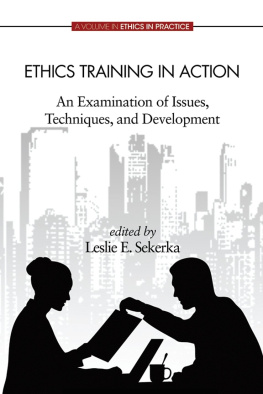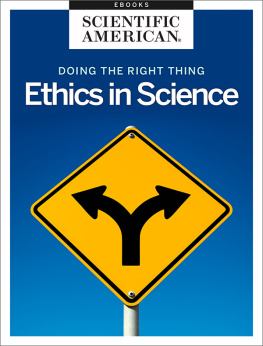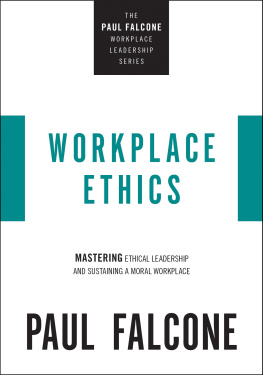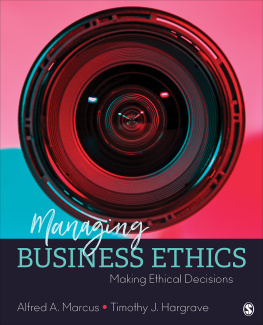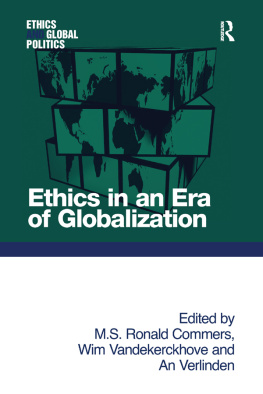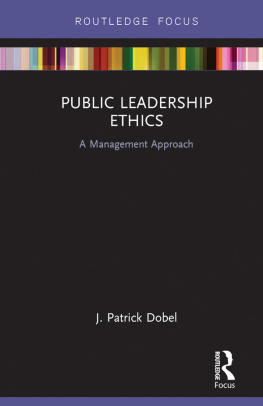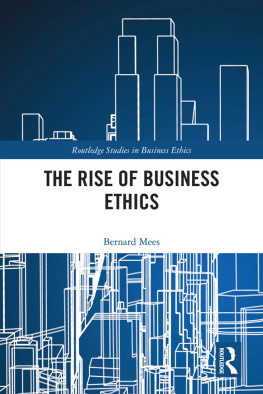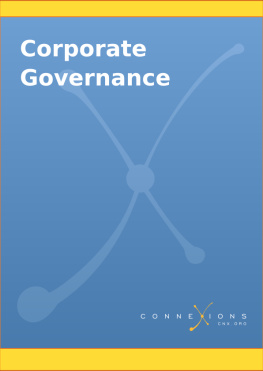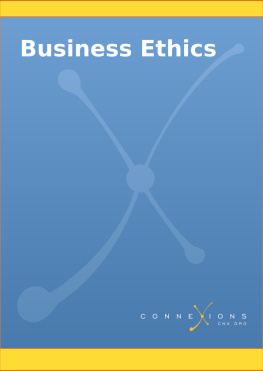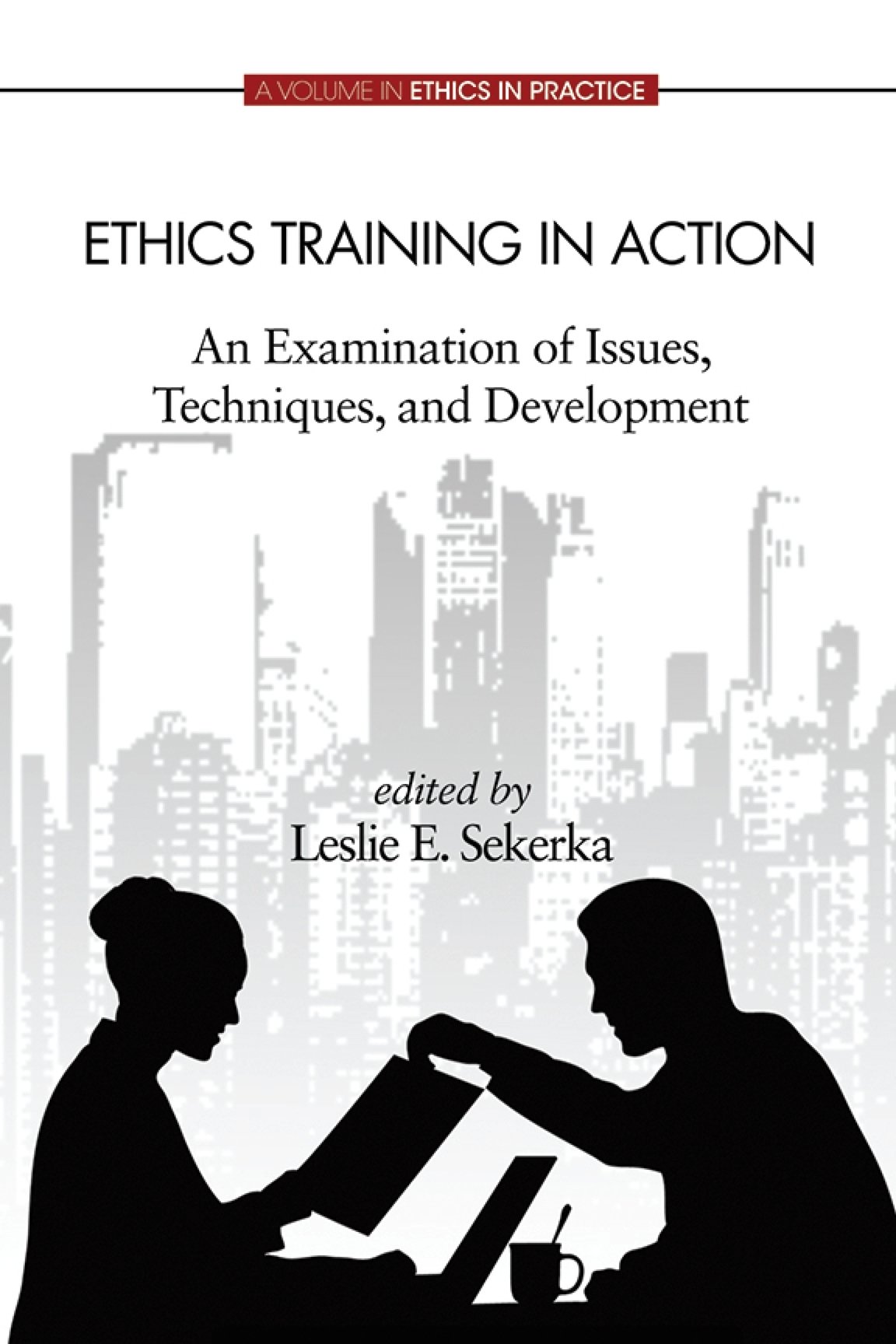Special thanks to the James Hervey Johnson Charitable Educational Trust for their unwavering commitment to advance ethics education. Thanks also go to Kirk Hanson and Jim Balassone, whose work at Santa Clara Universitys Markkula Center for Applied Ethics has provided ongoing insight and support. The reviewers and editorial team were exceptionally helpful, with special acknowledgements to Robert Giacalone, George Johnson, Lucy Sekerka and Dana Tomasino who shared their talent and dedication. Finally, to our contributors as well as other scholars and practitioners, we appreciate your steadfast pursuit of knowledge that moves to advance adult moral development in organizational settings.
ABOUT THE AUTHORS
Lauren E. Benishek is a doctoral candidate in the industrial and organizational psychology program at the University of Central Florida and a graduate research associate at the Institute for Simulation and Training. She earned a BS in Psychology in 2007 from Virginia Polytechnic Institute and State University. Her current interests include individual and team training development and evaluation, enhancing learning and training effectiveness, integrating simulation into learning contexts, understanding team process and performance, and facilitating teamwork. Ms. Benishek has led and been involved with several training development initiatives sponsored by the Department of Veterans Affairs, the American Psychological Associations Coalition for Psychology in Schools and Education, and the Florida Medical Malpractice Joint Underwriting Association. She was awarded the University of Central Floridas Trustees Doctoral Fellowship in 2008.
Eduardo Salas is Trustee Chair and Professor of Psychology at the University of Central Florida, where he also holds an appointment as program director for the human systems integration research department at the Institute for Simulation and Training. Previously, he was the Director of UCFs Applied Experimental and Human Factors PhD program. Before joining IST, he was a senior research psychologist and head of the training technology development branch of NAWC-TSD for 15 years. During this period, Dr. Salas served as a principal investigator for numerous R&D programs, including TADMUS, that focused on teamwork, team training, decision-making under stress, and performance assessment. Dr. Salas has co-authored over 450 journal articles and book chapters and has co-edited 25 books. His expertise includes assisting organizations in how to foster teamwork, design and implement team training strategies, facilitate training effectiveness, manage decision-making under stress, and develop performance measurement tools. Dr. Salas is a past president of the Society for Industrial/Organizational Psychology, fellow of the American Psychological Association, Human Factors and Ergonomics Society, and a recipient of the Meritorious Civil Service Award from the Department of the Navy. He is also the recipient of the 2012 Society for Human Resource Management Losey Lifetime Achievement Award, and the 2012 Joseph E. McGrath Award for Lifetime Achievement.
Dr. David Bright is an associate professor at Wright State University in Dayton, OH. He received a PhD in organizational behavior from the Case Western Reserve University Weatherhead School of Management. His areas of expertise include virtue ethics and positive organizational scholarship.
Dr. Ilma Barros is a research fellow with the Fowler Center for Sustainable Value at Case Western Reserve University and a member of the Presencing Institute. She earned a PhD in organizational behavior from the Case Western Reserve Weatherhead School of Management. She has two decades of experience consulting with organizations throughout the world, but especially in Brazil.
Mr. Veer Raghava Kumar Marthy is an MBA student at Wright State University. He has also received an M.P.A from Wright State University, and he is a Certified Nonprofit Professional (CNP) with particular interest in social cause-related innovations and social entrepreneurship.
Richard Charnigo is an associate professor at the University of Kentucky, with joint appointments in the Department of Biostatistics (College of Public Health) and Department of Statistics (College of Arts and Sciences). His research interests in statistics include mixture modeling (including applications to microarray data analysis) and nonparametric regression (including applications to pattern recognition problems in Raman spectroscopy and light scattering by nanoparticles). His collaborative research interests include cardiology, psychology, public health, and organizational behavior.
Leslie E. Sekerka, PhD is a professor of management and the founder and director of the Ethics in Action Research and Education Center at Menlo College (Atherton, CA). Dr. Sekerkas teaching and scholarship is designed to create a proactive approach to applied ethics. Her interests in adult moral development stem from twenty years of work and research in business and military organizations. Her scholarship and teaching focuses on the promotion of strengths in support of personal and organizational growth, ethical decision-making, and professional moral courage in the workplace. Her award winning research appears in a variety of academic venues, including journals, books, and special issues targeting positive organizational ethics. Dr. Sekerka works closely with the Silicon Valley business community as an academic partner at Santa Clara Universitys Markkula Center for Applied Ethics. She is known globally as an ethics training specialist, providing workshops and seminars that help advance employees moral competencies and build organizational ethical strength. Dr. Sekerka recently won the Charles B. Emerick Award for excellence in teaching.
Cathy Driscoll received her PhD in organizational behavior and marketing from Queens University in 1994. She is professor in the department of management in the Sobey School of Business at Saint Marys University in Halifax, Nova Scotia. Prior to Saint Marys, she worked as a project manager and policy advisor with the National Round Table on the Environment and the Economy in Ottawa. She has served as a director on the Better Business Bureau of the Atlantic Provinces and the Canadian Centre for Ethics in Public Affairs, and was a founding board member for the Canadian Business Ethics Research Network.
Cathys research interests include business ethics, ethical leadership, management education, stakeholder management, and spiritual and religious values in ethical decision making. She has published articles in the Journal of Business Ethics , Business and Society , and the Journal of Management, Spirituality and Religion .
Margaret C. McKee is an assistant professor in the management department of Saint Marys University, which is situated in Halifax on Canadas east coast. Margaret earned a PhD in management in 2008 and is in her fourth year of a tenure-track position teaching a mandatory ethics course to undergraduate and masters business students. Margaret transitioned to academia after a 20-year career as a professional communicator with publicly traded companies, federal and provincial government departments, and consulting agencies in central and eastern Canada.
Margaret has a variety of research interests and has secured grants from several Canadian funding agencies, including the Social Sciences and Humanities Research Council and the Canadian Centre for Ethics in Public Affairs. In addition to research examining business ethics training and development practices in Canadian companies, she is midway through a project examining CSR practices in Vietnam. Margaret is also interested in organizational leadership and has several studies underway examining the effects of a transformational leadership style on various organizational and employee outcomes, with a particular interest in employee well-being. Margaret has presented academic papers in Canada, the U.S., and Europe, and has published articles in the Journal of Business Ethics , the Journal of Leadership and Organizational Studies , and the Journal of Management, Spirituality and Religion .

